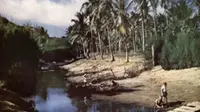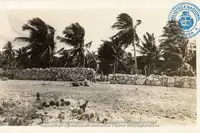
Boardwalk Boutique Hotel’s local heritage as former Coco Plantation and the history of Palm Beach in Aruba
One of the very first things you will notice upon entering Boardwalk Boutique Hotel is its unique garden. The tall palm trees that welcome you at Boardwalk are not present by accident: this boutique hotel is located on a historic coco plantation. This blog takes you on a journey back in time to give you a better understanding of the arrival of coconut and date palms in the northern area of Aruba referred to as ‘Palm Beach’. You’ll learn how Palm Beach got its name, and we’ll explain the connection between Boardwalk Boutique Hotel and the historic coco plantation called Plantage Tromp or translated in English: Plantation Tromp
History of Plantation Tromp
Documents available in connection to the history of Plantation Tromp show that in the 1890s a local family by the name of Tromp operated a small palm tree plantation in the northern part of Aruba in an area known today as ‘Palm Beach’. During this time Plantation Tromp focused on its core business of growing dates and coconuts, mainly for local consumption. In later years, around the time of commercial development of Palm Beach in the 1950s and 1960s, the lush terrain of Plantation Tromp became a favorite campground. It was rented out for family gatherings and to local groups like Scouting Aruba and St Dominicus Club. The property even welcomed Dutch royalty for an inspection of the local scouts by His Royal Highness Prince Bernard of Orange, the spouse of the former Queen of the Netherlands, Juliana.
Picture clarification below: His Royal Highness, Prince Bernard of The Netherlands visits Plantage Tromp during a local scouting gathering in 1955
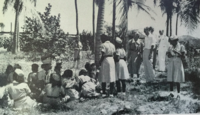
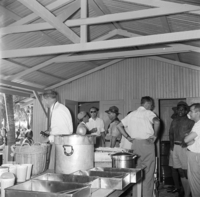
Carnival under the palm trees
In the 1970s, Plantation Tromp became a popular location during Carnival season as many Carnival parties were held there on Sundays in the afternoon. Other local groups also knew how to find their way to this lush hidden gem in a -then- unpopulated area and mainly rented the property for parties on Friday / Saturday night. Plantation Tromp was sold in 1989 to local owners who transformed the terrain into Boardwalk Boutique Hotel Vacation Retreat. They kept the natural foliage of tall palm trees and the owners dwelling intact yet added a few small casitas as vacation houses. Amidst the windsurfing craze of the 1980-s Boardwalk Boutique Hotel appealed mostly to windsurfers and participants in the international Hi-Winds windsurfing competition, because of its proximity to Aruba’s surf mecca Fisherman’s Huts. Over the next two decades Boardwalk Boutique Hotel gained a following of loyal guests and repeat visitors to Aruba.
Transitioning from a coco plantation to a boutique hotel
In 2010 Aruba-born twin sisters and kite surfing enthusiasts Kimberly and Stephanie Rooijakkers found their way to the Boardwalk property, that at the time also housed a kite-and windsurf repair shop. As soon as they entered the lush gardens of Boardwalk it was love at first sight. When they found out Boardwalk was for sale, a deal was quickly made. Under the new ownership Boardwalk Boutique Hotel transformed from a low-key vacation retreat to Boardwalk Small Hotel Aruba, and in 2019 the hotel expanded and renovated its property to the current 46-casita Boardwalk Boutique Hotel. Till this day the hotel honors the historic roots of the property as a former coco plantation as its lush garden is home to 30 different types of palm trees. The original owners dwelling of the coco plantation was carefully restored and kept intact as a historic site, while also serving as a spacious two-bedroom casita (number 108, in case you are wondering).

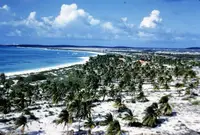
How Palm Beach in Aruba got its name
In 1917 local businessman Adriaan Laclé and doctor Hopkins, along with locals Jan Beaujon and Pancho Ruiz started planting date palms and coco palms on the sandy strip along the ocean in the northern district of Aruba. As this area was soon dotted with swaying palm trees, this small group of locals named the area Palm Beach. Unintentionally they more or less became the ‘founding fathers’ of today’s Palm Beach in Aruba. Although in the 1920s and 1930s there was not a hotel or the developments thereof insight, and all you would find on this beach were only palm trees.
The earliest developments of construction in this area date back to the early 1940s when Palm Beach Club, the Jewish Country Club and Pova Beach Club opened buildings on Palm beach for recreational purposes, followed in 1957 by Basiruti -now the location of Playa Linda- and in 1959 the Aruba Caribbean Hotel, which today is known as Hilton. Until the early 1950s the palm tree plantations thrived. Yet with the arrival of a larger hotel on Palm Beach better infrastructure to and through this area was needed. The palm tree plantations had to make way for a new road, the Juan Irausquin Boulevard, referred to nowadays as The Strip. Despite the elimination of all active palm plantations over time and the addition of a dozen new high rise hotels, the Palm Beach name survived the test of time and is used till this day.
Picture clarification below: Clipping of local Dutch newspaper Amigoe di Aruba, detailing the history and development of Palm Beach

From owners dwelling to vacation home
“My uncle owned Plantation Tromp, a working coco plantation filled with palm trees, until it was sold in 1989. My father took care of most of the maintenance work over the years and quite often I accompanied my father to the plantation. My first memories of plantation Tromp go back to 1963 when I was about 8 years old. What fascinated me most was all those hundreds of palm trees, the beautiful sound they produced and to see how the wind pushed all those palm leaves forward. My uncle lived in the only building present on the plantation; the same building that is still intact on property today, now known as Casita 108.” - Miguel Tromp
